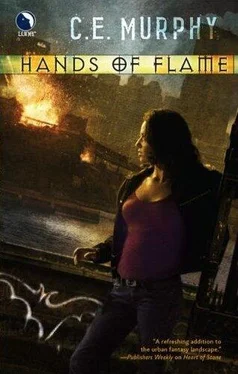“Stop that. It looks horrible, as if all the snakes driven from Ireland have taken up under your skin and can’t get free. He is chained up in another sealed-off room, throwing more of a tantrum than you, and I’ve no idea where your lawyer friend is. Better off without you, I’d say,” Grace said sourly. “Not that either you or she will listen to the likes of me.”
Breathless confusion pounded through Alban, counterpart to the pain the chains brought. Speaking helped: being spoken to helped. Even Grace’s clear pique helped push away the bleak, mindless rage. “I do not understand.” He kept the words measured, trusting deliberation over the higher emotions that heated his blood. “How did we come here? What are you doing? What did Biali want?”
“Grace has her tricks, and a few friends to call on when she needs to. I’m trying to stop a fight before it schisms your people,” Grace added more acerbically. “As for what Biali wants, you tell me.”
Alban breathed, “Tricks,” incredulously, then, distracted from the thought, said, “Revenge,” the word heavy and grim and requiring no need of consideration. “Revenge for Ausra.”
Grace stepped back with an air of sudden understanding, speaking under her breath. “So it wasn’t Margrit who saved herself after all. And Biali found it out.” She paced away, then stopped, hands on her hips, chin tilted up, gaze distant on a wall. “Then I’ve done what’s best, haven’t I?”
“What have you done?”
Grace turned, all leonine curves in black leather. “I’ve sent for a gargoyle jury.”
The countdown calendar was at sixteen hours, failing to take into account the after-court work Margrit returned to the office to do. She waved goodbye as coworkers slipped out, and gave the calendar a rueful glance. If she was lucky it wasn’t off by more than three or four hours.
She was alone at sunset, bent over paperwork that gave her a cramp between her shoulder blades, but it redoubled, then racked her with breath-taking shocks of pain. Semifamiliar images crashed through her mind in spasms, too brief and disconcerting for her to hold. They had the feeling of being seen through someone else’s eyes, as though she once more rode memory with Alban. Minutes after the sky went dark with twilight, concrete chambers finally came into resolution, body-wracking shudders fading away. Fingers clawed against her desk, breathing short with astonishment and dismay, Margrit struggled to recognize the rooms. Finally, sweat beaded on her forehead and hands trembling from holding her desk too hard, her own memory clarified where she’d seen them before.
Belowground, in Grace O’Malley’s complex network of tunnels under the city.
There were innumerable ways to enter those tunnels, but only one Margrit felt certain of. She stopped long enough to change shoes, then, still wearing the skirt suit she’d worn to court, left the office at a run.
Minutes later she scrambled over the fence to Trinity Church’s graveyard, all too aware that she had no good explanation if she was caught. She dropped to the ground easily, suddenly surrounded by headstones, some worn beyond readability, others as sharply etched as if they were new. Wilted flowers lay on a handful of graves, though an April breeze caught lingering scent from one bunch and carried it to her. The church itself was a dozen yards away, glowing under nighttime lights, lonely without its tourists and parishioners.
Paths brought her to an inset corner of the church near its front entrance. She glanced over her shoulder, nervous action, and mumbled an apology to the dead as she stepped over a grave and placed her palm against one of the church’s pinkish brown stones, pressing hard.
The scrape of stone against stone sounded hideously loud in the churchyard’s silence. Margrit held her breath, as if that would somehow quiet the opening door, and for a moment heard the city as it actually was, rather than simply the background noise of day-to-day life. Engines rumbled in the near distance, ubiquitous horns honking. The wind carried a voice or two, but most of the sound came from mechanical things.
The door ceased its scrape and she stepped inside it, looking guiltily around the churchyard again. If she’d designed a hidden door, she would have put it at the back of the church, not the front. She saw no one, though, and pressed the door closed again as she used her phone for a flashlight.
The light bounced off pale walls. Margrit blinked at the steep stairs that led downward, never having seen them so clearly before. The walls had been scrubbed, an inch of soot washed away, and the stairway was much brighter for it. She trotted down, curious to see what other changes had been made.
The room at the foot of the stairs was almost as she remembered it, though cleaner. Walls reaching twenty feet on a side had been washed free of their sooty blanket, and the cot settled in one corner no longer touched those walls. A small wooden table was also pulled a few inches away from the wall, its single chair pushed beneath it. Bookcases lined the walls, candles and candleholders set on them. Electric lights had been added, wires looping above the shelves. There was nowhere to cook in the room, nor any obvious ventilation. Only Alban’s books were missing, safe in his chamber in Grace’s domain.
She switched on the lights and tucked her phone back in her pocket before moving Alban’s cot to reveal the flagstone they’d escaped through. It was two feet on a side. Margrit sat down on the cot, dismay rising anew. She’d forgotten its size, and the incredible strength necessary to move it. Even in his human form, Alban was disproportionately strong. Margrit could barely conceive of his gargoyle-form’s strength limitations. Certainly her own weight was inconsequential to him. Half-welcome recollection flooded and warmed her, the memory of his hands, strong and gentle, holding her, guiding her, seeking out her pleasure. In flight, in love, that strength had been sensual.
And in battle it had been terrifying. Margrit made fists and opened them again deliberately, trying to push away the remembrances, and stood to examine the stone. She had no other way to get into Grace’s tunnels, so she would have to lever the stone out somehow. Grooves marked two sides of its sides and she slid her fingers into them, then laughed with frustration at the uselessness of her attempt.
Stone grated against stone again, sound rolling down the stairs. Margrit froze, eyes wide, then spun around in a circle, searching for somewhere to hide. There was nowhere, save under the cot, and for some reason the idea struck her as absurd to the point of embarrassment.
“Pardon me.” A terribly polite voice came from the direction of the stairwell. Margrit, for all she knew someone was coming down the stairs, shrieked in surprise and whipped around again.
An Episcopalian priest with an erratic white beard peered around the corner. “Pardon me,” he repeated drolly. “I hate to interrupt, but I saw you come down, and I feel rather obliged to tell you that—er, Ms. Knight?”
“Father.” Margrit squeaked the honorific, utterly at a loss to explain herself. “I’m, um. Oh, God. Uh.”
“Merely a representative,” the priest said cheerfully. “Ms. Knight, what an unexpected pleasure. What are you doing here? I haven’t seen you in a while. Either of you,” he added more calculatingly. “How is Alban?”
“In trouble,” Margrit replied in a burst. “That’s what I’m—I needed to get into the tunnels. I didn’t even think to come ask if I could come here. I would have, if I had.” The old man’s kindness and his awareness of both Alban’s presence beneath the church and Alban’s secret had been evident the time or two Margrit had spoken with him.
Читать дальше












